
Sidney Luckman was an American professional football quarterback who played for the Chicago Bears of the National Football League (NFL) from 1939 through 1950. During his 12 seasons with the Bears, he led them to four NFL championships in 1940, 1941, 1943, and 1946.
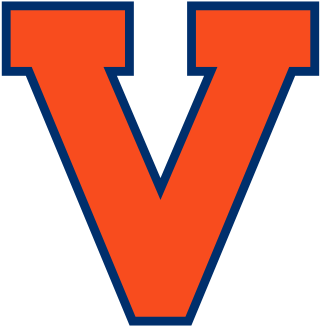
The Virginia–Virginia Tech football rivalry is an American college football rivalry between the Virginia Cavaliers football team of the University of Virginia and Virginia Tech Hokies football team of Virginia Polytechnic Institute and State University. The two schools first met in 1895 and have played annually since 1970. The game counts for 1 point in the Commonwealth Clash each year, and is part of the greater Virginia–Virginia Tech rivalry.
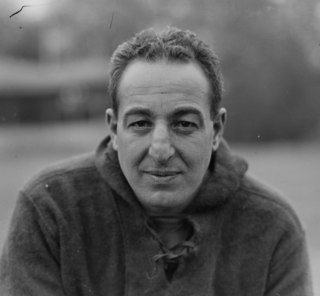
Luigi "Lou Little" Piccirilli December 6, 1891 – May 28, 1979) was an American football player and coach born in Boston, Massachusetts. After Lou's birth, his father changed his family name to "Little", translating the Italian family name and moved his family to Leominster in 1896. Little played football at Leominster High School where he was the team captain in 1910, his senior season. The 1910 team, led by Little’s stellar play, was Leominster’s first undefeated football team. Little went on to play one postgraduate season for the Worcester Academy Hilltoppers in 1911 before returning to coach his alma mater Leominster High School for one season in 1912. He served as the head coach at Georgetown College, now Georgetown University, from 1924 to 1929 and at Columbia University from 1930 to 1956, compiling a career college football record of 151–128–13. Little played college football as a tackle at the University of Pennsylvania for the 1916 and 1919 seasons and then with the professional football team the Frankford Yellow Jackets from 1920 to 1923. He was inducted into the College Football Hall of Fame as a coach in 1960. He appeared as Lu Libble in Jack Kerouac's novel Maggie Cassidy, a fictionalized account of Kerouac's early life.
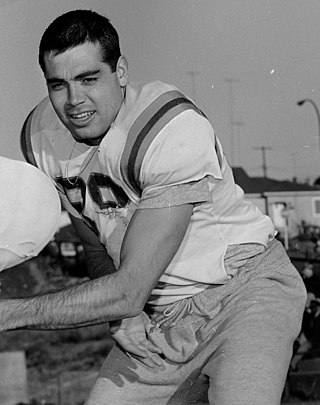
Joseph Robert Garcia Kapp was an American football player, coach, and executive. He played college football as a quarterback for the California Golden Bears. Kapp played professionally in the Canadian Football League (CFL) with the Calgary Stampeders and the BC Lions and then in the National Football League (NFL) with the Minnesota Vikings and the Boston Patriots; with the Vikings, he led them to victory in the 1969 NFL Championship Game, the only league championship in team history. Kapp returned to his alma mater as head coach of the Golden Bears from 1982 to 1986. He was the general manager and president of the BC Lions in 1990.

In American football, a T formation is a formation used by the offensive team in which three running backs line up in a row about five yards behind the quarterback, forming the shape of a "T".

The Washington Huskies football team represents the University of Washington in college football. Washington competes in the NCAA Division I Football Bowl Subdivision (FBS) as a member of the Pac-12 Conference. Husky Stadium, located on campus, has been the Huskies' home field since 1920.

The Columbia University Lions are the collective athletic teams and their members from Columbia University, an Ivy League institution in New York City, United States. The current director of athletics is Peter Pilling.

The Liberty Cup is a trophy awarded to the winner of the college football game between Columbia University and Fordham University, two National Collegiate Athletic Association (NCAA) Division I football programs in New York City. The cup was awarded annually from 2002 to 2015, but the two teams have not met since then.
Norries Wilson is an American football coach and former player. He was the running backs coach of the Rutgers University Scarlet Knights football team, but was let go in 2015. He was the first African-American head football coach in the Ivy League with the Columbia University football team.

The Cornell Big Red football team represents Cornell University in National Collegiate Athletic Association (NCAA) Division I Football Championship Subdivision (FCS) college football competition as a member of the Ivy League. It is one of the oldest and most storied football programs in the nation. The team has attained five national championships and has had seven players inducted into the College Football Hall of Fame.
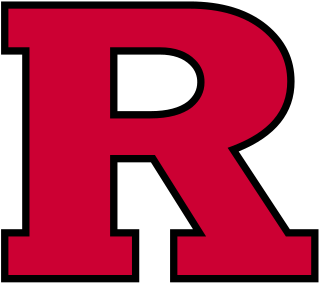
The Rutgers Scarlet Knights are the athletic teams that represent Rutgers University's New Brunswick campus. In sports, Rutgers is famously known for being the "Birthplace of College Football", hosting the first ever intercollegiate football game on November 6, 1869, in which Rutgers defeated a team from the College of New Jersey with a score of 6 runs to 4.
The 1944 season was the Chicago Bears' 25th in the National Football League. The team was co-coached by Hunk Anderson and Luke Johnsos with Paddy Driscoll as the assistant coach.
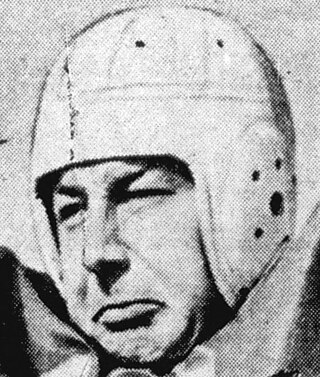
Charles Christopher "Chuckin' Charlie" O'Rourke was an American football player and coach. He played college football as a quarterback at Boston College and professionally with Chicago Bears of the National Football League (NFL) and the Los Angeles Dons and Baltimore Colts of the All-America Football Conference (AAFC). O'Rourke quarterbacked the Boston College Eagles football team to one of its most famous wins. His 24-yard run late in the fourth quarter gave the 1940 Eagles a 19–13 victory over Tennessee in the 1941 Sugar Bowl, staking BC's claim to a national championship. O'Rourke served as the head football coach at University of Massachusetts Amherst (UMass) from 1952 to 1959, compiling a record of 21–39–4. In 1972, he came the first Boston College player to be inducted into the College Football Hall of Fame.
The 1934 Rose Bowl, played on January 1, 1934, was an American football bowl game. It was the 20th Rose Bowl Game. The Columbia Lions defeated the Stanford Indians 7-0. Cliff Montgomery, the Columbia quarterback, was named the Rose Bowl Player Of The Game when the award was created in 1953 and selections were made retroactively. At 35,000, it has the lowest attendance in the Rose Bowl game since the Rose Bowl Stadium was built in 1922. This was one of the few rainy New Year's Day celebrations in Pasadena, California. Rain three days before had turned the Rose Bowl stadium into a small lake.
The Columbia Lions baseball team is a varsity intercollegiate athletic team of Columbia University in New York City. The team is a member of the Ivy League, which is part of the National Collegiate Athletic Association's Division I. Columbia's first baseball team was fielded in 1868. The team plays its home games at Robertson Field at Satow Stadium in New York City. The Lions are coached by Brett Boretti.

The Penn Quakers football program is the college football team at the University of Pennsylvania in Philadelphia. The Penn Quakers have competed in the Ivy League since its inaugural season of 1956, and are a Division I Football Championship Subdivision (FCS) member of the National Collegiate Athletic Association (NCAA). Penn has played in 1,413 football games, the most of any school in any division. Penn plays its home games at historic Franklin Field, the oldest football stadium in the nation. All Penn games are broadcast on WNTP or WFIL radio.

The Prairie View A&M Panthers football team is the college football team representing the Prairie View A&M University. The Panthers play in NCAA Division I Football Championship Subdivision (FCS) as a member of the Southwestern Athletic Conference (SWAC).
The 1933 Columbia Lions football team was an American football team that represented Columbia University as an independent during the 1933 college football season. In their fourth season under head coach Lou Little, the Lions compiled an 8–1 record and outscored opponents 179 to 45, with four shutouts.

Gene Rossides was an American football player who was drafted by the New York Giants in 1949. He was a lawyer by training, held political office in several administrations, and was the founder of the American Hellenic Institute. For his success in various fields of government, sports, and journalism, the Greek Ministry of Foreign Affairs called him "one of the most emblematic figures of the Greek diaspora."
The 1983 Columbia Lions football team was an American football team that represented Columbia University during the 1983 NCAA Division I-AA football season. Columbia placed second-to-last in the Ivy League.
















